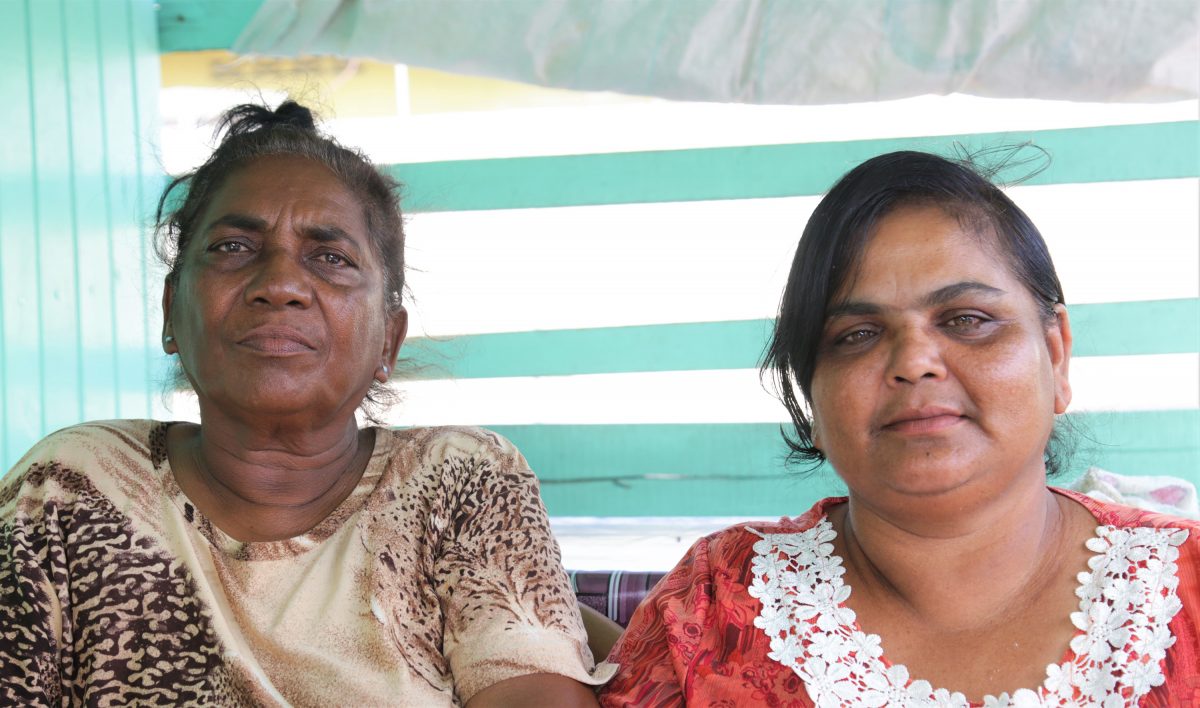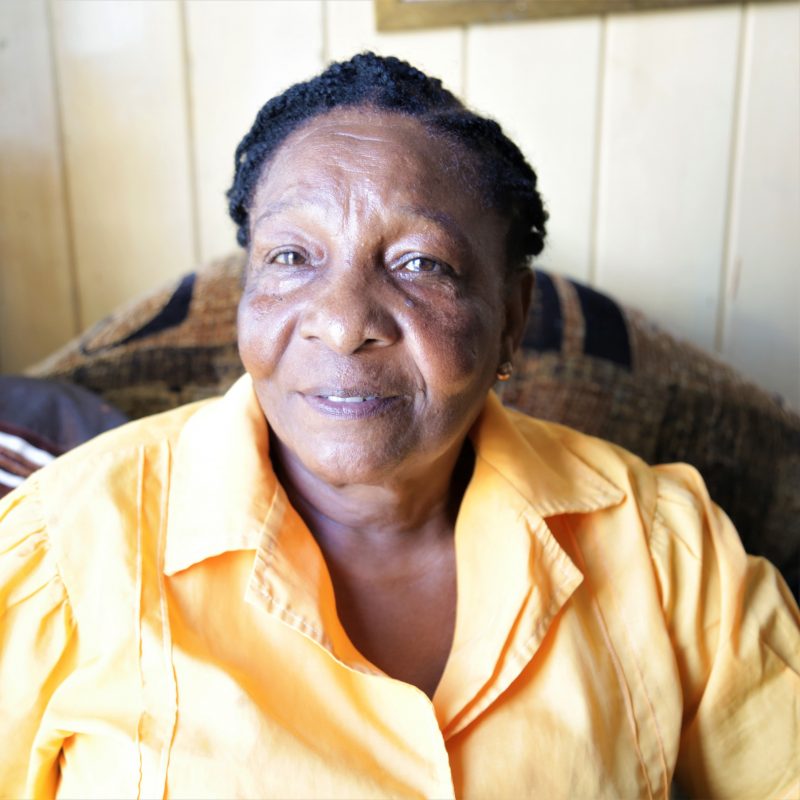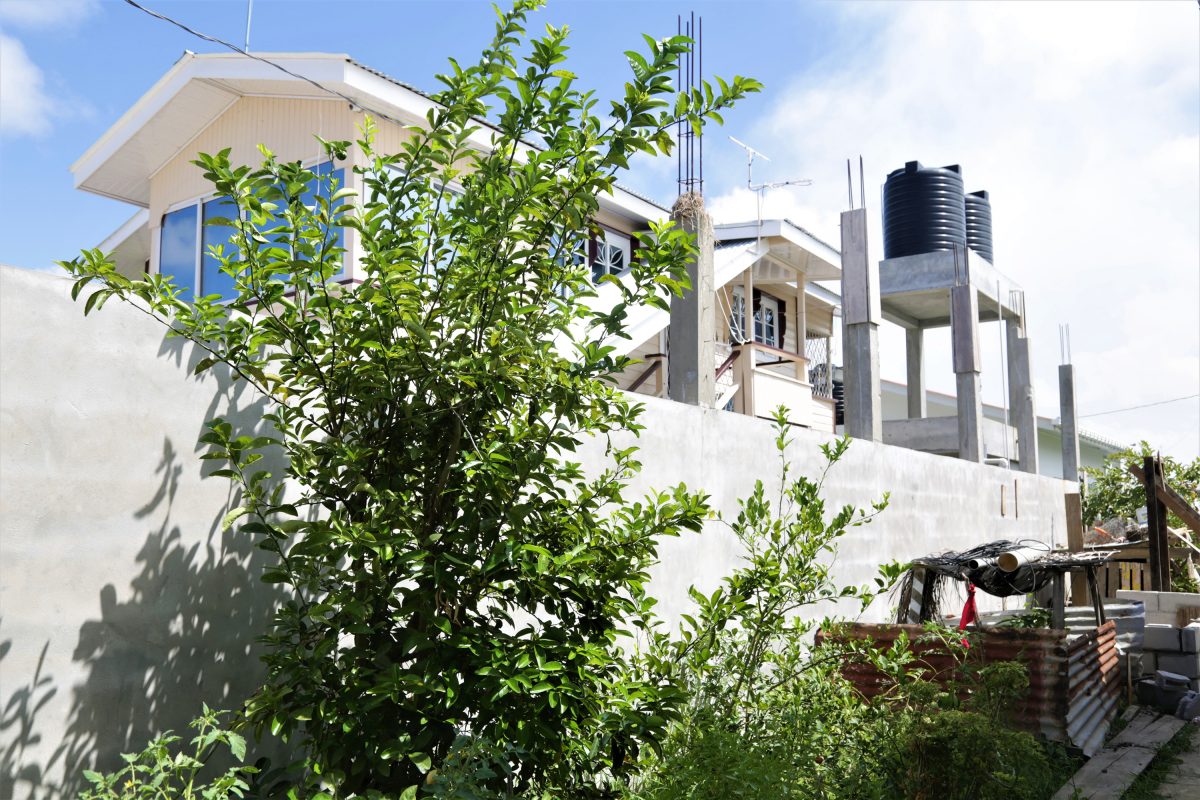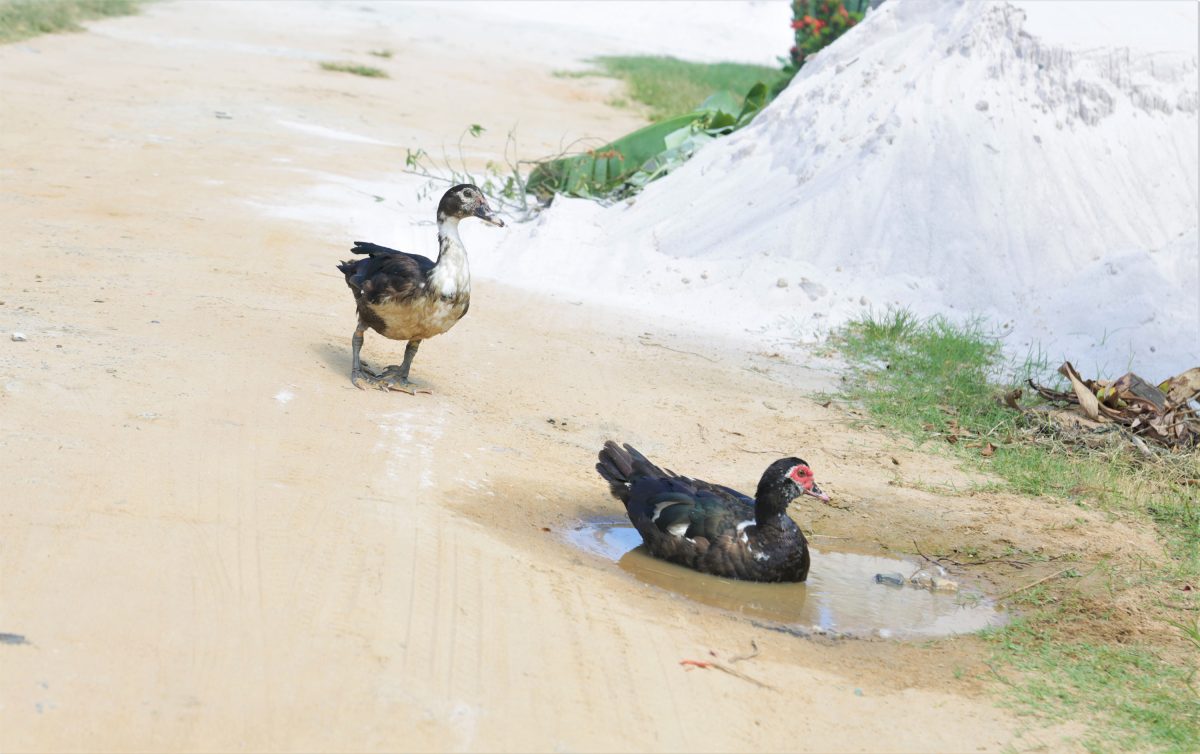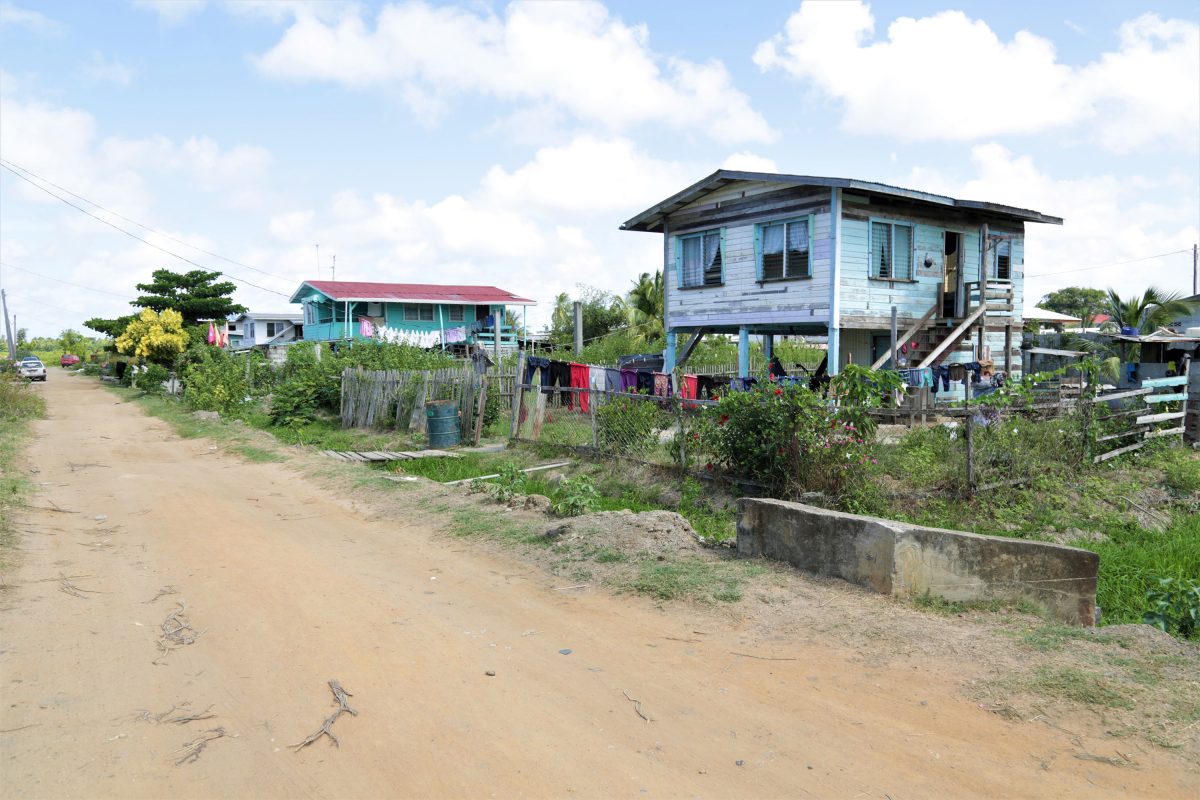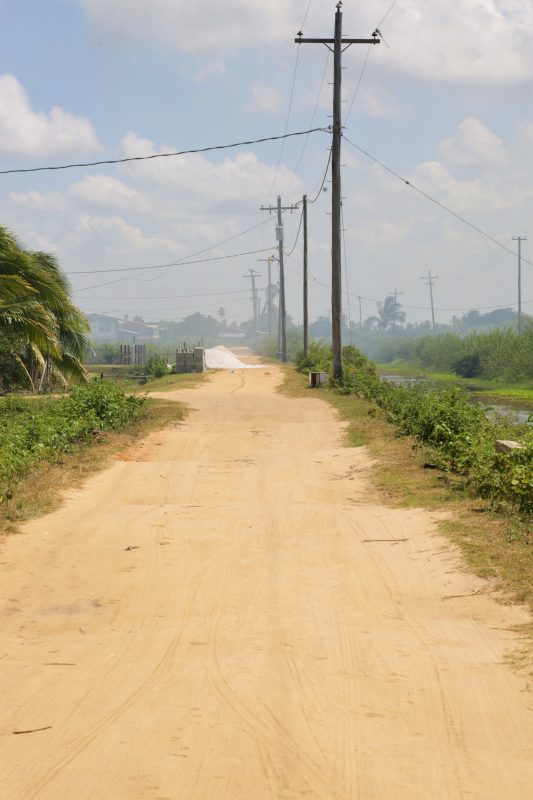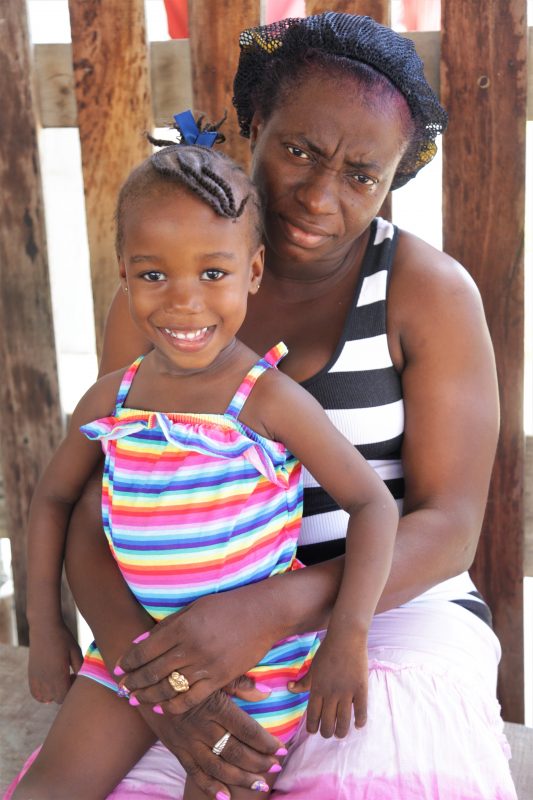New Scheme, Hope Estate is a multi-ethnic community totalling approximately 200 residents from many different parts of Guyana. Most persons there depend mainly on farming for their livelihood while others work in construction, mining or are self-employed.
When I arrived, there were wisps of smoke in the air from the already harvested rice fields being burnt. Most of the men were said to be in the backdam and children were at school except for those at nursery level or younger. Women were relaxing, one or two in the shops, doing laundry, or tending to their gardens. Almost every house has a kitchen garden. Families who moved from Joe Hook and Grass Hook in the Mahaica Creek brought their farming skills with them. Others just took up the activity even if it was just planting enough to provide for their families. There is very little cattle or poultry, possibly because it is a housing scheme and there is not enough land space to rear them.
A few dogs prowled the streets in search of scraps. Some horses grazed in one of the empty lots and even before they were seen, they were heard. The potholes along the village road had collected water and two ducks fancied them as ponds.
Seventy-one-year-old Herma Adams hails from Plantation Uwit, Sand Hills, Demerara River. Raised by her grandmother after her mother passed when she was just a year old, Adams later moved to Mc Doom, Georgetown to live with an older sister and attend Houston Secondary School. She also lived in Belfield and Melanie Damishana on the East Coast Demerara. It has been 13 years since she moved to New Scheme, Hope Estate and she explained that she was initially given land in Tuschen Housing Scheme, East Bank Essequibo. However, on considering the distance to the city she declined and waited a bit more until she heard about house lots at New Scheme, Hope Estate.
The youngest of 12 children, Adams has 11 of her own, all of whom are adults. One of her adult grandsons resides in the bottom flat of her house, while she and a younger grandson live upstairs. Living in a multiethnic village is nothing new to her. She grew up among Amerindians and spent many years living among people of East Indian descent, so she gets along with everyone, she shared. Instead of being addressed by her name, she is called granny by just about everyone. She said the people of New Scheme are her extended family.
“… The neighbours they are nice; no problems at all. Sometimes they pass and I would get greens or whatever they bringing out. Nobody really buys anything here. Most of them work in their farms way down at the back. It’s quiet and nice here. The school is nearby, there’s taxis in the area. I have my special taxi; I would call Fat Bai and he would take me wherever I have to go. If I want anything, I would say Fat Bai come and I would give him my gas bottle or tell him to buy credit for me,” Adams said.
She attends the Full Gospel Church, which is the only place of worship in the village. She enjoys a social life with church members, as the pastor is always taking them on different trips around the country.
Most of the people living in the village are Hindus. The closest mandir is at Plantation Hope, but many Hindus stay at home and pray at their family altars.
When Adams arrived in New Scheme, the main road leading to the different communities in Hope Estate was really bad and drivers would refuse to use it, forcing everyone to walk half an hour or more to their homes. The main road has since been properly constructed, but those in the scheme are still made of loam and are currently marked with potholes. Adams would like to see them fixed, particularly the red dirt road the children often traverse to the Hope Nursery and Primary schools.
Security guard Vonetta Wickham, who works at night, should have been resting but instead was up and about assisting in her shop and was about to do some work in her kitchen when I arrived at her home. “Here is a very nice place but it’s just transportation really. Every time you going out, you got to pay $300 one way with the taxis. If you going out and you forget something you got to turn back and that’ll $300 to go and come again or they charge you a $200,” Wickham said.
As a security guard she is worried for her own security, noting that it is not safe at night in Hope Estate. The overgrown bushes shields robbers and she added that robberies are more likely while the morning is still dark or as soon as night steps in. The bushes were always kept low along the road, but recent changes have brought this to a stop. Wickham said also that in recent years women have been raped along the dark and lonely road.
This is not the only issue that challenges Wickham and her family. The woman also pointed out that her neighbour’s fence was almost as high as her house with huge columns that were put in to take the fence twice as high. With the average house lot size being 5,000 square feet, the family feels blocked in. The woman said she went into the Neighbourhood Democratic Council, but nothing much was done as the man said he had links and enough money to build as he likes. In addition, sand from the construction has drifted into the drain, preventing the water from running thereby making it stagnant and smelly. Just days ago, Wickham’s three-year-old granddaughter fell into the drain and she said that to rid her of the stench, she had to bathe the child with Jeyes Fluid and Fabuloso cleaner. Wickham is pleading that the matter be handled the right way.
Aside from that one neighbour, Wickham said, the people are really nice and cooperative. The village recently saw a rise in population with Venezuelan refugees settling there.
Wickham moved to New Scheme from Ann’s Grove three years ago. Like Adams, she had been awarded a house lot at Tuschen but decided to wait. She explained that in Ann’s Grove there is an abundance of public transportation unlike the scheme. Every night she takes taxis from home to work and back, and feels she is working just to pay taxi fares.
To restock her shop, she travels to Georgetown or Ann’s Grove whenever the need arises.
Nearby, her husband slept on a bench. A carpenter, he only works whenever work presents itself. At present there was no ongoing construction that needed him.
Wickham is also a member of the Full Gospel Church and she mentioned that the same evening was worship service. As much as she looks forward to going, she is not always able to do so. She recalled that there have been times when she intended heading to night services but in trying to get some rest before heading out she ended up waking when service was done. Usually, that’s how her day flies by.
Shereen Sarjoo hails from Joe Hook, Mahaica Creek and her neighbour Hemwanttie Sukhu from Grass Hook. Families from both villages settled in New Scheme because of severe flooding where they once lived.
“Where I used to live in Joe Hook,” Sarjoo said, “was nice. You could plant as you like and catch fish. Is the flood that bring out we. When we plant we cash crop, when time fuh reap, the water come and duck it out and we lose plenty crops. Is only them crops that was high off the ground like bora we coulda pick and you can’t make it touch the water.”
Unlike Wickham, Sarjoo has no issues with the transportation having come from an area where the only means of transportation was by boat. While living at New Scheme is more convenient for her as it means having easier access to electricity, potable water and other necessities it is also more expensive.
A breast cancer survivor, Sarjoo said the taxis make getting to the hospital easier. Speaking about it made her emotional so nothing more was said on the subject.
The woman said that she does not feel nearly as safe as she did when living in Joe Hook. She always ensures that she is at home before it gets late. Nevertheless, she is grateful that there is a police outpost nearby as that makes it easier to sleep at nights. She praised the police, adding that if they pick up the phone and call them, they respond immediately.
Sarjoo is a widow and her relatives take care of her. She said her husband never worked with any of the estates so there is no NIS benefits to look forward to. She is eagerly waiting for next year when she can start receiving her old age pension.
Sukhu, a widow also, lives with her two adult sons. When her husband died her sons were still of school age, so she began selling beverages, chicken, eggs and pastries. It was not easy, she said, but she was able to send her boys to school until they completed their education. They now take care of her and she no longer has to work so hard anymore except for taking care of their home and planting her kitchen garden.
“Back in Grass Hook it was quiet and peaceful and tranquil. Coming here it’s not any of those really but it’s good for us. It made things easier for my family especially for my sons who attended Bygeval and Hope Secondary schools,” Sukhu said.
Among the developments she hopes for New Scheme, Hope Estate are better roads, streetlights, and telephones.
